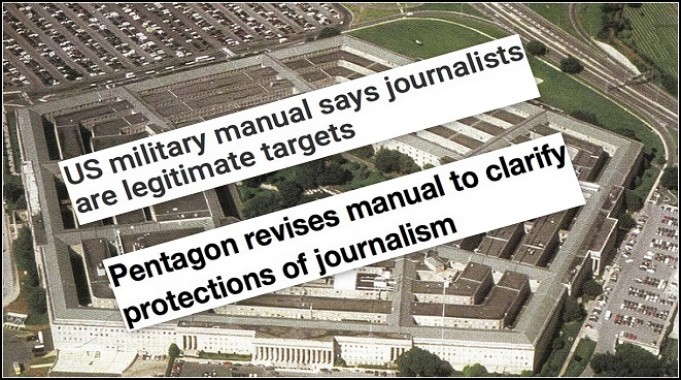Pentagon: reporters are not ‘enemies’
Pix : From June 2015 to July 2016 the thrust of The Pentagon's policy towards journalists in conflict zones has changed significantly.
Last month, the Environment Ministry put up draft rules on its website for governing environmental projects that were lifted, verbatim, from an American government document laying out similar rules.
Since plagiarism seems popular in government circles, may be the Information & Broadcasting Ministry would like to copy a new Pentagon policy on how to treat journalists in conflict situations?
According to the New York-based Committee to Protect Journalists (CPJ), the Pentagon has said that it no longer considers journalists operating independently of US military forces as potential spies, terrorists, or saboteurs. In the latest, revised version of the US military’s Law of War Manual, the role of journalists in independently reporting armed conflicts and their need to meet people from all sides of the conflict, including the enemy, have been accepted.
It now recognizes that: "Journalists play a vital role in free societies and the rule of law and in providing information about armed conflict."
As is well known, America detained many journalists during the Iraq war for their contacts with enemy forces. Others were held in Afghanistan and Guantanamo Bay.
The Pentagon released its first Department-of-Defense-wide Law of War Manual in June 2015. It included language that allowed journalists to be categorized as "unprivileged belligerents," which could have allowed military commanders to detain journalists indefinitely outside the rules of war without ever charging them.
"The new language is a seismic shift for the U.S. military," said CPJ Senior Adviser for Journalist Security Frank Smyth on its website . "This affirmation of journalists' right to report armed conflicts freely and from all sides is especially welcome at a time when governments, militias, and insurgent forces around the world are routinely flouting the laws of war."
Chhattisgarh officials, please note. Here, reporting on the Naxalite insurgency has become well-nigh impossible and often dangerous. In February, Scroll writer Malini Subramaniam was hounded out of the state. So were Shalini Gera and Isha Khandelwal, two lawyers from the Jagdalpur Legal Aid Group. Political activist Soni Sori was attacked. Journalists Somaru Nag, Santosh Yadav, Prabhat Singh and Deepak Jaiswal were arrested.
The interference has become so aggressive that Chhattisgarh journalists have demanded a new law specifically to protect them. Chhattisgarh advocate Sudha Bharadwaj has drafted a new law called the Chhattisgarh Special Act for Protection of Journalists and Human Rights Defenders which will be tabled in the state assembly as a private member’s bill soon.
Compare this with the Pentagon’s recognition, in its revised Law of War Manual, that journalists need access to information from all quarters and protection as civilians because they play a vital role in free societies and in providing information about armed conflict.
The revised Law of War Manual includes these key passages:
"In general, journalists are civilians and are protected as such under the law of war."
"Journalists play a vital role in free societies and the rule of law and in providing information about armed conflict."
"Moreover, the proactive release of accurate information to domestic and international audiences has been viewed as consistent with the objectives of U.S. military operations."
"DoD [Department of Defense] operates under the policy that open and independent reporting is the principal means of coverage of U.S. military operations."
"[E]ngaging in journalism does not constitute taking a direct part in hostilities such that a person would be deprived of protection from being made the object of attack."
"Where possible, efforts should be made to distinguish between the activities of journalists and the activities of enemy forces, so that journalists' activities (e.g., meetings or other contacts with enemy personnel for journalistic purposes) do not result in a mistaken conclusion that a journalist is part of enemy forces."
This is a simple concept that some Chhattisgarh functionaries with a ‘for us or against us’ mentality find hard to comprehend. Instead, they assume that any journalist who has links with the Maoist insurgents or meets them is by definition an insurgent himself or herself. The charge against Santosh Yadav, who was arrested last September, is that of working for the Maoists. He was charged under sections of the Chhattisgarh Public Safety Act and Arms Act.
Random sections of the statute book are being thrown at journalists to silence them. Prabhat Singh, for example, was charged with obscenity under Section 67 of the Information Technology Act for a Whatsapp message that allegedly spoke in derogatory terms about IG Bastar, S. G. Kalluri when in fact it was merely a typo.
And, as the Hoot reported recently Chhattisgarh police arrested Sheikh Anwar for allegedly procuring weapons and ammunition for the Maoists.
Last March, the Editors Guild of India fact finding committee said that they could not find 'a single journalist who could claim with confidence that he/she was working without fear or pressure' in the state.
In October 2015 the Assam Rifles told editors in Nagaland that they could not publish statements issued by militant organisations in the state, and that if they did it would be construed as "support to an unlawful association". After an outcry the regiment backed down.
The hostility of the police, military, and government officials is another layer of difficulty for journalists who are already working in combat conditions with no protective gear and so special security training. On top of this, they can be accused by both sides of collaborating with the enemy. This is very tough terrain, only for the strong-hearted.
If the government cannot deal with the militancy without throttling journalists and stopping the flow of information, they need to re-examine their tactics. And if it can’t make it easier for journalists to do their job, the least it can do is refrain from making it even harder. Failing this, they can always open the US Manual and press Ctrl A+Ctrl C+Ctrl V.
Amrit Dhillon is a freelance journalist based in New Delhi.







